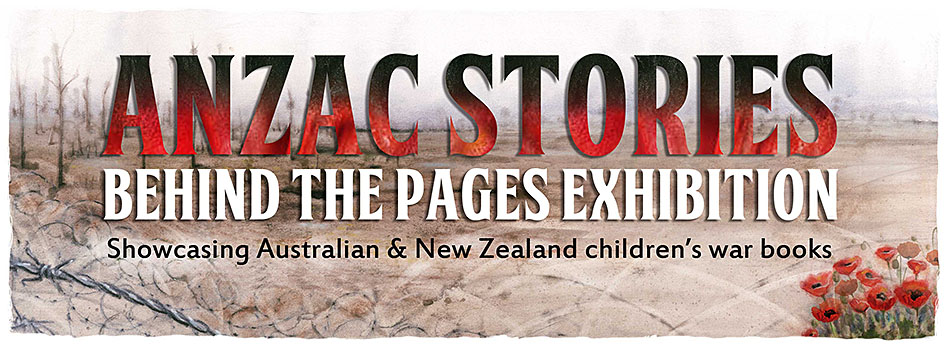 Pamela Rushby was born in Queensland more
years ago than she cares to divulge. She has worked in advertising; as a
pre-school teacher; and as a writer and producer of educational television,
audio and multimedia.
Pamela Rushby was born in Queensland more
years ago than she cares to divulge. She has worked in advertising; as a
pre-school teacher; and as a writer and producer of educational television,
audio and multimedia.
Pam has written children's books and television
scripts; hundreds of radio and TV commercials; multi award-winning documentaries
on Queensland dinosaurs, Australian ecosystems, bilbies, the Crown of Thorns
starfish and buried Chinese terracotta warriors; short stories; and freelance
journalism. She has won several awards, including a Literature Board of the
Australia Council grant to work on archaeological excavations in Egypt and
Jordan; a Churchill Fellowship to study educational television in Canada; the
Ethel Turner Prize in the NSW Premier's Literary Awards; four Notable Books in
the Children's Book Council of Australia awards; and a bag of gold coins at a
film festival in Iran.
Her historical novels include When the Hipchicks Went to War (Hachette 2009), The Horses Didn't Come Home
(HarperCollins 2012), Flora's War (Ford
Street Publishing 2013), The
Rat-catcher's Daughter (HarperCollins 2014), and Sing a Rebel Song (Omnibus 2015).
She is passionately interested in children's books and
television, ancient history and Middle Eastern food. www.pamelarushby.com
The
Horses Didn’t Come Home
ISBN: 9780732293543
Author: Pamela Rushby
Publisher: Harper Collins
Buy Here
Middle
East 1919. In an army camp in the desert, a young Australian soldier named
Harry is grooming and saddling his horse, Bunty. She is a sturdy, strong,
faithful Australian waler who belongs to Harry’s younger sister, Laura, back
home in Australia. Harry took Bunty into the army with him when he joined the
Light Horse in 1914. As Harry finishes the grooming he stands in front of
Bunty. The two of them, horse and master, are totally still. Then Harry swings
up into the saddle. A few soldiers watch Harry and Bunty as they ride off into
the desert. No one says a word. It’s their last ride together.
The
last great cavalry charge in history took place at Beersheba in the Sinai
desert in 1917. It was Australian horses and soldiers that took part in, and
won, this amazing, unexpected, unorthodox victory. The men proudly claimed it
was their great-hearted horses that won the day. But in the end, the horses
didn’t come home …
Interview:
Positive
outcome when writing:
This
was such a sad ending to write. Of the 160,000 Australian horses sent overseas
during World War 1, only one of them, just one,
ever came home. At the end of the war, there weren’t enough ships to bring even
the soldiers home. Some were still waiting in 1919. There was certainly no room
for horses. So the old and sick horses were shot, and others were to be sold:
to the British army (which would have been all right) or locally (which may not
have been all right, given that animals were not generally well treated in the
area). A few soldiers chose, instead, to take their horse for a ‘last ride’ and
came back carrying the saddle, saying the horse had broken a leg and they’d had
to shoot it.
But
what happened to the ones that were sold?
Some
time later, after the war, an English woman named Dorothy Brooke was on holiday
in Cairo. She was horrified to see ex-war horses, sick, underfed, badly
treated, pulling heavy loads. On her return to England she wrote to a
newspaper, and started a fund to set up a hospital for war horses in Cairo, the
Old War Horse Memorial Hospital. This provided free veterinary care for working
horses and donkeys in Cairo. The charity, now called The Brooke, still operates
today. Its workers treat animals in ten countries around the world, providing
veterinary services and educating the animals’ owners in animal care. I was very pleased that there was a positive
outcome.
Something
sad or tragic:
The
way the horses were treated after the war horrified me. The old and sick horses
were shot. But before they were shot, the army cut off their manes (which could
be sold) and removed their horseshoes (also sold). Once the horses were dead,
they were skinned and their hides sold. It didn’t seem much of a thank-you for
their faithful service.
Something
interesting:
I
read a lot of soldiers’ diaries and letters while I was researching. And I came
across an incident that just made me say WOW! A soldier had some leave due, and
he chose to travel up the Nile to Luxor and the Valley of the Kings. While he
was exploring in the Valley of the Kings, he noticed a small white tent among
the rocks and sand. In it sat an Englishman, directing a group of local workers
who were excavating a site in the desert. The Englishman was … Howard Carter.
This was years before he became famous for discovering the tomb of Tutankhamun.
The soldier actually had tea with Howard Carter! I just had to include this incident in the
book.
Link to teacher’s notes


No comments:
Post a Comment